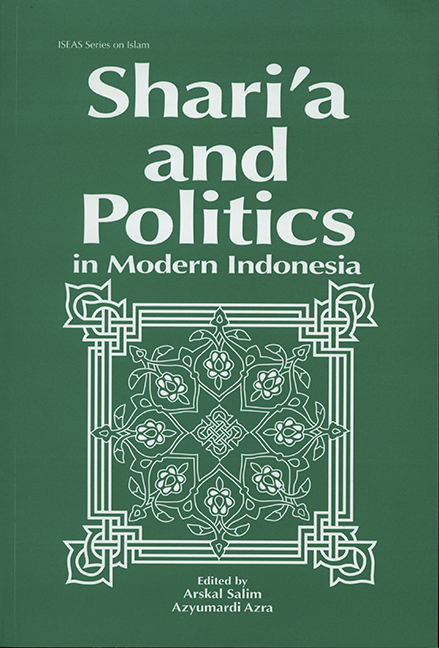Book contents
- Frontmatter
- Contents
- Acknowledgments
- List of Contributors
- Glossary
- 1 INTRODUCTION: The State and Shari'a in the Perspective of Indonesian Legal Politics
- 2 LAW AND POLITICS IN POST-INDEPENDENCE INDONESIA:A Case Study of Religious and Adat Courts
- 3 THE STATE AND SHARI'A IN INDONESIA
- 4 THE STATE'S LEGAL POLICY AND THE DEVELOPMENT OF ISLAMIC LAW IN INDONESIA'S NEW ORDER
- 5 THE INDONESIAN MARRIAGE LAW OF 1974: An Institutionalization of the Shari'a for Social Changes
- 6 INDONESIA'S 1989 RELIGIOUS JUDICATURE ACT: Islamization of Indonesia or Indonesianization of Islam?
- 7 THE POLITICAL BACKDROP OF THE ENACTMENT OF THE COMPILATION OF ISLAMIC LAWS IN INDONESIA
- 8 ISLAMIZING CAPITALISM: On the Founding of Indonesia's First Islamic Bank
- 9 FATWA AND POLITICS IN INDONESIA
- 10 ZAKAT ADMINISTRATION IN POLITICS OF INDONESIAN NEW ORDER
- 11 ISLAMIC VALUES, LAW AND EXPECTATIONS IN CONTEMPORARY INDONESIA
- 12 EPILOGUE: Shari'a in Indonesia's Current Transition: An Update
- APPENDICES
- Bibliography
- Index
1 - INTRODUCTION: The State and Shari'a in the Perspective of Indonesian Legal Politics
Published online by Cambridge University Press: 21 October 2015
- Frontmatter
- Contents
- Acknowledgments
- List of Contributors
- Glossary
- 1 INTRODUCTION: The State and Shari'a in the Perspective of Indonesian Legal Politics
- 2 LAW AND POLITICS IN POST-INDEPENDENCE INDONESIA:A Case Study of Religious and Adat Courts
- 3 THE STATE AND SHARI'A IN INDONESIA
- 4 THE STATE'S LEGAL POLICY AND THE DEVELOPMENT OF ISLAMIC LAW IN INDONESIA'S NEW ORDER
- 5 THE INDONESIAN MARRIAGE LAW OF 1974: An Institutionalization of the Shari'a for Social Changes
- 6 INDONESIA'S 1989 RELIGIOUS JUDICATURE ACT: Islamization of Indonesia or Indonesianization of Islam?
- 7 THE POLITICAL BACKDROP OF THE ENACTMENT OF THE COMPILATION OF ISLAMIC LAWS IN INDONESIA
- 8 ISLAMIZING CAPITALISM: On the Founding of Indonesia's First Islamic Bank
- 9 FATWA AND POLITICS IN INDONESIA
- 10 ZAKAT ADMINISTRATION IN POLITICS OF INDONESIAN NEW ORDER
- 11 ISLAMIC VALUES, LAW AND EXPECTATIONS IN CONTEMPORARY INDONESIA
- 12 EPILOGUE: Shari'a in Indonesia's Current Transition: An Update
- APPENDICES
- Bibliography
- Index
Summary
The political atmosphere in the post-New Order era is evidently marked with the euphoria of democracy or political liberalization. One of its manifestations, as William R. Liddle ever predicted, is that in a more open political climate the expression of more formalistic Islam (the scripturalists) would appear, since “they would have many more political resources, in mass acceptance of their ideas, organization, allies, media, and access to politicians”.
There are at least four features of such appearance in the current scene. First is the establishment of numerous Islamic political parties that mostly adopt Islam as their basis replacing Pancasila, which the Soeharto regime forcefully implemented to be the sole basis of any organization. Two parties, the United Development Party (PPP) and the Crescent Star Party (PBB), insist that Article 29 of the 1945 Constitution be amended to reinsert the famous “seven words” (dengan kewajiban melaksanakan syariat Islam bagi pemeluknya [with the obligation to carry out shari'a for its adherents]). With these words, it will officially provide shari'a with the constitutional status within the Indonesian national legal system. This proposal to reintroduce the clause, which will require Indonesian Muslims to apply shari'a, has been unsuccessful in three consecutive annual sessions of the Majelis Permusyawaratan Rakyat (MPR) in 2000, 2001, and 2002. In the 2002 annual session, the MPR has decided not to amend Article 29 of the 1945 Constitution. However, Islamic parties continue to advocate the formal application of shari'a.
Second is the growing demand from certain regions of Indonesia for the formal implementation of shari'a. Aceh is the first province that demanded for the application of shari'a. In fact the application of shari'a in this region was sporadically undertaken when in November 1999, a young man accused of committing adultery was punished by being whipped one hundred times in public. Similarly in South Sulawesi, there is an increasing aspiration to implement shari'a for its Muslim adherents. Abdul Aziz Qahhar Muzakkar, chief of the preparation committee for the application of shari'a in South Sulawesi, said that the special autonomy status granted to Aceh, including the implementation of shari'a, has paved the way for other provinces to secure the same status
- Type
- Chapter
- Information
- Shari'a and Politics in Modern Indonesia , pp. 1 - 16Publisher: ISEAS–Yusof Ishak InstitutePrint publication year: 2003



